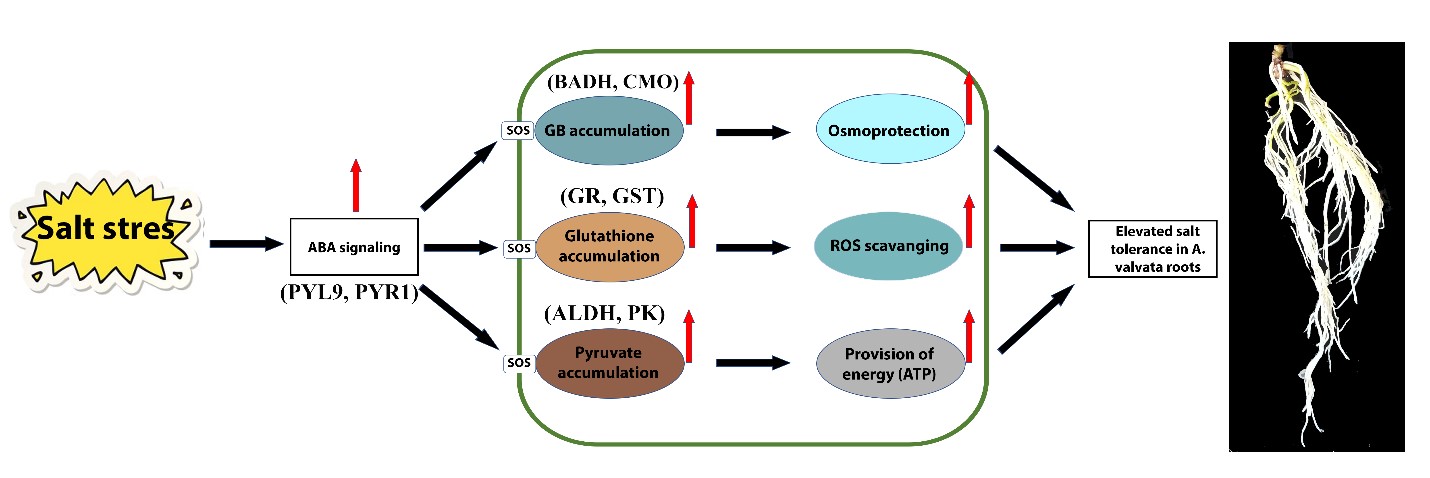Recently, the Kiwifruit Resource and Breeding Innovation Team of Zhengzhou fruit Research Institute, Chinese Academy of Agricultural has carried out a comparative transcriptomic and metabolomic study to dissect the intricate molecular regulatory mechanisms underpinning the salt stress tolerance in kiwifruit. The team has published the results in “Horticulture Research” (JCRQ1, Impact factor 7.291).
The Actinidia(commonly known as kiwifruit) comprised on several economically important species which are widely recognized for their health benefits. Despite the presence of rich Actinidia germplasm resources in China, only a handful of species are domesticated, such as A. chinensis var. Chinensis, A. chinensis var. Deliciosa, A. arguta and A. eriantha whose fruit meets the commercial demands. Asexual propagation techniques are exclusively practiced to propagate kiwifruit, and elite fruiting varieties are commonly grafted on sexually propagated rootstock plants. Available kiwifruit rootstocks are pretty sensitive to abiotic stresses that can damage plant metabolism. The salt effected soils in Northern part of China (abundantly populated by natural germplasm resources of Actinidia) are posing serious threat to kiwifruit industry in the region.Therefore, it is highly prudent to find a suitable rootstock with enhanced salt tolerance ability to boost the kiwifruit plantation and production in salt effected areas of China.
In the present study, a comparativetranscriptome and metabolome analysis was carried out in salt sensitive (Hayward, HWD) and salt tolerant (a special genotype ZM-H) under 0.4% (w/w) salt stress for 0, 12, 24, and 72 hours.
Results showed that salt stress specifically triggered the pathways related to hormone signaling (ABA), osmoprotection(Glycine betaine, GB), ROS scavenging (Glutathione, GR), and energy provision (Pyruvate). The WGCNA analysis identified five important genes from GB pathway, glutathione pathway, sugar metabolism pathway, and pyruvate pathway. The integration of transcriptome and metabolome analysis data suggested that pyruvate metabolism is an important pathway for salt stress tolerance in kiwifruit.
A gene from GB pathway (AvBADH, betaine aldehyde dehydrogenase) was selected for functional validation against salt stress. The results showed that overexpression of AvBADH gene in A. thaliana and A. chinensis (Hongyang, HY) significantly enhanced the salt tolerance compared to WT plants.
The set of genes identified in this study laid a theoretical foundation to utilize natural resources of kiwifruit for developing genetically engineered salt tolerant rootstock for kiwifruit industry in China. This study was conducted by Muhammad Abid and Shichao Gu (Equal contribution), and supervised by Yunpeng Zhong and Jinbao Fang. This project was supported by Agricultural Science and Technology Innovation Program of the Chinese Academy of Agricultural Science (CAAS-ASTIP-2021-ZFRI), the China Agriculture Research System of MOF (CARS-26).

Model explaining the intricate salt tolerance mechanism in kiwifruit plants
原文链接:Thefull-text link:https://academic.oup.com/hr/advance-article/doi/10.1093/hr/uhac189/6675621?guestAccessKey="b6bcad06-501b-49c3-8f8b-ed8eb20e2359
By: Muhammad Abidmuhammadabid@qq.com
Yunpeng Zhongzhongyunpeng@caas.cn
